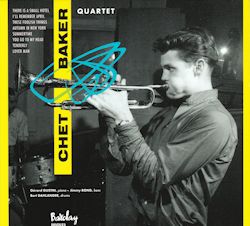Lover Man
Chet Baker - Trumpet
Gérard Gustin - Piano
Jimmy Bond - Bass
Bert Dahlander - Drums
This recording, which took place in Paris on October 24 1955, is set against the sombre background of the sudden death, due to a heroin overdose,
of the Quartet's pianist Dick Twardzik, only three days before. Gérard Gustin, at that time an up-and-coming young French pianist, replaced
Twardzik. The drummer Peter Littman, who had suffered the trauma of discovering Twardzik's body, also missed this session. The Swedish drummer Bert
Dahlander took his place. The wonder of it was that Chet Baker and Jimmy Bond were able to participate, in the circumstances, and furthermore to
give such outstanding performances. The disc is enhanced by an inspired selection of material, comprising eight memorable standards from the Great
American Songbook.
There's A Small Hotel bounces along cheerfully, with inventive
improvisation from Baker and neat cameos from Gustin and Bond.
On I'll Remember April Chet leads the charge with his
usual facility but the group as a whole gel together effectively.
There's an accomplished solo from Gustin. A moody These Foolish
Things features deft bass/piano interplay. Autumn In
New York does full justice to a lovely tune. There is languid,
beautiful playing from Baker and delicate support from Gustin.
If it's possible to combine coolness with heart, Chet manages
it on Summertime. Jimmy Bond is at his best here. On
the romantic ballad You Go To My Head (the best track,
for my money), the group excel, showing how measured improvisation
can yet be totally creative. Tenderly takes us on a sentimental
journey of introspective reverie, but never loses touch with the
melody. Lover Man is, of course, one of the most recorded
jazz classics. Baker is content to simply demonstrate once more
his penchant for gentle, ruminative music. Grubin, meanwhile,
confirms just how gifted he is with yet another magical performance.
All in all, this is bewitching music which still sounds contemporary after all these years. The liner notes make the claim that the Barclay
recordings, of which this was a part, represented a watershed for Chet Baker. They were his only studio recordings for fifteen months, until he
returned to the States in June 1956. After this, it is argued, a long, slow decline set in, due to Baker's increasing problems with drugs. We are
told “These weeks leading up to the Paris recordings, eventful as they might have seemed at the time, were really the calm before a life-long
storm.” The facts of Chet's life are well-known. It is good to have this reissue to remind us of how he sounded while still very near the peak of
his powers.
James Poore
